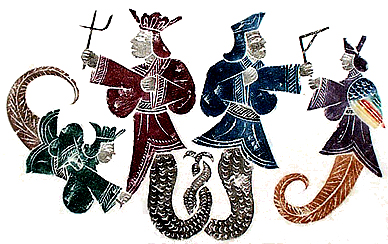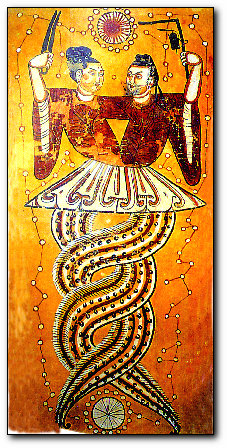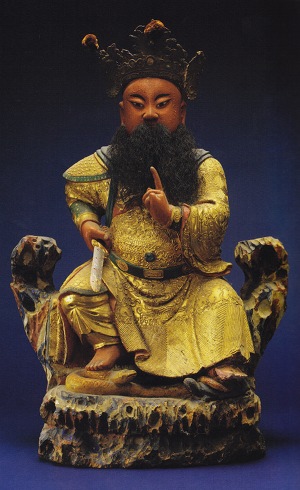Boat Burning Festival
/
North Star Martial Arts
In depth discussions of internal martial arts, theatricality, and Daoist ritual emptiness. Original martial arts ideas and Daoist education with a sense of humor and intelligence.
Books: TAI CHI, BAGUAZHANG AND THE GOLDEN ELIXIR, Internal Martial Arts Before the Boxer Uprising. By Scott Park Phillips. Paper ($30.00), Digital ($9.99)
Possible Origins, A Cultural History of Chinese Martial Arts, Theater and Religion, (2016) By Scott Park Phillips. Paper ($18.95), Digital ($9.99)
Watch Video: A Cultural History of Tai Chi
New Eastover Workshop, in Eastern Massachusetts, Italy, and France are in the works.
Daodejing Online - Learn Daoist Meditation through studying Daoism’s most sacred text Laozi’s Daodejing. You can join from anywhere in the world, $50. Email me if you are interesting in joining!

 Below I have answered some questions that were sent to me via email about the post I wrote last week, 5 Levels of Internal Muscle Training. I love getting emails. For reference the 5 levels are:
Below I have answered some questions that were sent to me via email about the post I wrote last week, 5 Levels of Internal Muscle Training. I love getting emails. For reference the 5 levels are:Why do the steps laid out in the "5 steps of muscular training" post seem so rigid and schematic?
At which point does one start "grounding force?"
At which point in the five level progression does a person touching you--give you the feeling that his/her force is directly going to the floor through your body?
I'm totally losing my muscular strength, as well as my weight... in your training did you experience weight loss? I'm 12 pounds less than I used to be when I started training taiji one year ago, and this is not necessarily going to stop. Teacher said, oh, you'll replace that with taiji strength, don't worry?
Training with my Chinese "uncles" is at times pretty much not funny. Sometimes I think their biggest goal is not losing face. Their understanding of cooperative training seems quite different from mine. I mean, I don't have to use muscular strength, but this Chinese man in his 60's is stiff as hell, and strong too, so the natural reaction would be to use more strength than him. I see these gentleman (and ladies as well) who have been training for years but still rely on muscular, stiff strength, and I guess they are happy like that. How should the transition from muscular strength to a more song, tongtou, strength feel? How does it work?
My Chinese "uncles" seem to have only "success/fail" exercises. I'm not getting "learn to feel" or "get more sensitive" exercises. Am I just too un-sensitive or are they giving me inappropriate exercises for that type of development?
 I’ve been working with the “ball” material I wrote about in the last post and I’ve decided that there is an other way to explain it.
I’ve been working with the “ball” material I wrote about in the last post and I’ve decided that there is an other way to explain it. I used the term autonomic above. The nervous system is divided into two types of nerves, the ones that control obviously voluntary actions (yes that would include ear wiggling even if you aren’t very good at it yet); and nerves that control much less voluntary things like pupil size and heart rate. The less voluntary system is called the autonomic nervous system and it is also divided into two parts. One part that is active when you take a deep relaxing breath while sitting in a hot tub, and another part that is active when you hold your breath, tense up your muscles, pull back your lips and grit your teeth. The relaxing nervous system is called para-sympathetic, the stressed out nervous system is called sympathetic. (I know the names are ridiculous, they refer to anatomy you only see when you are doing a dissections.)
I used the term autonomic above. The nervous system is divided into two types of nerves, the ones that control obviously voluntary actions (yes that would include ear wiggling even if you aren’t very good at it yet); and nerves that control much less voluntary things like pupil size and heart rate. The less voluntary system is called the autonomic nervous system and it is also divided into two parts. One part that is active when you take a deep relaxing breath while sitting in a hot tub, and another part that is active when you hold your breath, tense up your muscles, pull back your lips and grit your teeth. The relaxing nervous system is called para-sympathetic, the stressed out nervous system is called sympathetic. (I know the names are ridiculous, they refer to anatomy you only see when you are doing a dissections.) This is an image of the god Xuantian, (Mysterious heaven). He is a slightly more martial form of the same god also called Ziwei or Zhenwu (Perfected Warrior). Xiantian is the god who also goes by the name Xuande (Mysterious Nature), the god who met with Zhang Sanfeng the night before he invented Taijiquan on Wudang Mountian.
This is an image of the god Xuantian, (Mysterious heaven). He is a slightly more martial form of the same god also called Ziwei or Zhenwu (Perfected Warrior). Xiantian is the god who also goes by the name Xuande (Mysterious Nature), the god who met with Zhang Sanfeng the night before he invented Taijiquan on Wudang Mountian. God of Accounting!
God of Accounting! This morning I was back in the fog of my old quarry with the ravens and the peregrine falcon. I'm back in San Francisco but I still have a few posts to organize about my trip to Taiwan.
This morning I was back in the fog of my old quarry with the ravens and the peregrine falcon. I'm back in San Francisco but I still have a few posts to organize about my trip to Taiwan.A place to train and learn about traditional Chinese martial arts, which are a form of religious theater combined with martial skills.